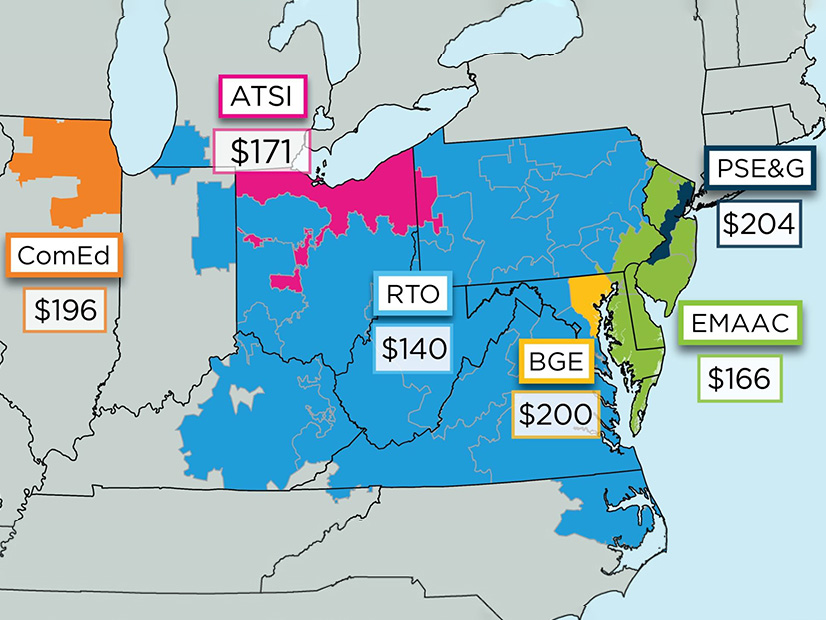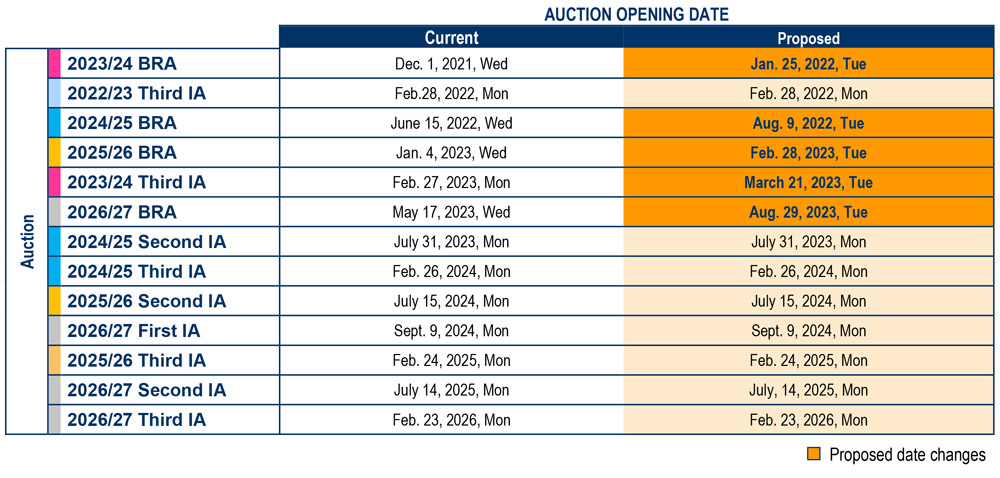
PJM is asking FERC to delay the Base Residual Auction for the 2023/24 delivery year by almost two months, citing the commission’s Sept. 2 order revising the RTO’s market seller offer cap (MSOC).
In a compliance filing Friday, PJM recommended delaying the start of the 2023/24 BRA by 55 days, from Dec. 1 until Jan. 25, 2022 and the 2023/24 third incremental auction from Feb. 27, 2023 to March 21, 2023 (ER21-2877). The filing also seeks to change the starts of subsequent Reliability Pricing Model (RPM) auctions, moving the 2024/25 BRA from June 15, 2022 to Aug. 9, 2022; the 2025/26 BRA from Jan. 4, 2023 to Feb. 28, 2023, and the 2026/27 BRA from March 17, 2023 to Aug. 29, 2023.
PJM said changing the dates of the RPM auctions is necessary to maintain the six-and-a-half-month gap between auctions so that market participants “have sufficient time to review the results of each auction before deciding whether to continue offering a resource in the subsequent auction.”
The RTO said its request was prompted by FERC’s Sept. 2 order adopting the Independent Market Monitor’s unit-specific avoidable cost rate (ACR) proposal and requiring PJM to revise its tariff (EL19-47, EL19-63, ER21-2444). The Monitor’s proposal followed FERC’s March order requiring PJM to revise the MSOC to prevent sellers from exercising market power in the capacity market. (See FERC Backs PJM IMM on Market Power Claim.)The RTO said the auction delay was necessary to give capacity market sellers and the Monitor a “realistic opportunity” to appeal the RTO’s final decisions on unit-specific offer cap requests resulting from the MSOC rules change.
“PJM does not make the decision to seek a further delay of the already delayed upcoming BRA lightly,” the RTO said in its filing. “PJM strongly believes the three-year forward nature of the capacity auctions is a critically important feature of the Reliability Pricing Model construct and would prefer to expeditiously conduct the upcoming auctions without delay. At the same time, however, given the expected volume of unit-specific requests stemming from the significant change to the MSOC rules, PJM believes that a revised timeframe must be established to allow for an orderly and complete Market Monitor and PJM review of all such requests.
Stakeholder Opinions
PJM received mixed feedback on the proposed delay at last week’s Market Implementation Committee meeting.
Chen Lu of PJM provided an overview of the capacity MSOC order, while Pete Langbein, manager of PJM’s demand side response operations, presented the draft timelines for the pre-auction activities for the upcoming BRA impacted by the order and the timing of the auction.
Langbein said PJM attempted to focus the timeline changes on the pre-auction tasks and activities that were “clear and transparent” to avoid stakeholder confusion. Langbein said the RTO was searching for a way so stakeholders would have a “reasonable amount of time” to finish their activities for the auction.
“The BRA auction and the associated timeline is pretty complicated, and there are a lot of dependencies between the different activities,” Langbein said. “There’s a bit of a dance to make all these different dates work.”
Paul Sotkiewicz of E-Cubed Policy Associates said he thought it would be better for his clients to have PJM compress the timeframe and “keep the auctions moving on time.”

Jason Barker of Exelon said he appreciated PJM’s attempt to balance the “orderly administration of the auction” by proposing a delay. But Barker said Exelon “tilted towards” the idea of keeping the December auction on schedule and that one of the company’s biggest concerns with changing dates was the possibility of having to redo any ACR submittals that had already been submitted.
Market Monitor Joe Bowring said that, without a delay, generation owners would have eight days to complete their ACR filings, which would be “close to impossible” for anyone having to make new ACR submittals.
“We all like to live in a completely certain world with certain deadlines, but that’s not where we are,” Bowring said, adding that PJM is “likely to see some more uncertainty” in the capacity auctions when the minimum offer price rule (MOPR) order is finally decided.
Jim Benchek of FirstEnergy said he would “urge” PJM to file the delayed schedule. Benchek said if a market seller didn’t anticipate having to go through the unit-specific net ACR calculation process, completing the process in eight days is “almost an impossible amount of time.”
“You need to afford market sellers the right amount of time to do things thoroughly and correctly,” Benchek said.
Langbein said no matter what timeline is ultimately approved by FERC, the process is going to be new for many stakeholders and will create a large volume of requests.
“We do not believe this is something administrative that’s going to be easy to do,” Langbein said.
MSOC Order
In March, the commission ordered PJM to revise its MSOC, siding with arguments made in separate complaints filed in 2019 by the IMM and several consumer advocate groups that challenged the RTO’s Capacity Performance (CP) assumptions and arguing the existing rules were allowing sellers to exercise market power.
In August 2018, the Monitor concluded that PJM ratepayers were overcharged by $2.7 billion (41.5%) in the 2018 BRA because of “economic withholding” encouraged by the inflated MSOC. (See IMM: PJM 2018 Capacity Auction was ‘Not Competitive’.)
Unit-specific MSOCs are to be based on avoidable costs and the opportunity cost of taking on a CP obligation, the Monitor said, including expectations of bonus payments or penalties for performance during an emergency. The timespan for measuring performance was changed from PAHs to five-minute performance assessment intervals (PAI) in compliance with FERC Order 825 in 2018.
A PAI is triggered when PJM determines a supply reliability issue exists, providing credits for generators that overperform their capacity commitments and penalties for those who underperform.
The Monitor originally suggested using 60 PAIs or five PAHs — compared with the current 360 PAIs/30 PAHs — in calculating a more appropriate seller cap.
FERC ordered PJM and its stakeholders to determine a suitable replacement rate within 45 days of the filing in March, addressing the “appropriateness of using different values” for penalty PAI and expected PAI in the default CP MSOC calculation and a method for setting each value.
Ultimately the IMM’s unit-specific ACR proposal filed on April 28 won out over three other proposals submitted to the commission.
The unit-specific ACR proposal said offers should be capped at the resource’s unit-specific net ACR, meaning “unit-specific gross ACR minus forward-looking net energy and ancillary service revenues, with the option to use the technology-specific default gross ACRs minus unit-specific forward-looking net energy and ancillary service revenues.” The Monitor said the commission recently accepted technology-specific default gross ACRs in the MOPR proceeding.
The IMM said its proposal would be a “return to the requirements prior to the introduction of CP, when offers were capped at unit-specific net ACR.” The Monitor said it already has experience with calculating unit-specific and default net ACR offer caps in the capacity market, and the process is “manageable from an administrative perspective” as the PJM tariff already includes a formula for the unit-specific gross ACR review.
FERC said the unit-specific ACR proposal was preferable to the three other options presented to the commission because it would “best ensure the capacity market’s overall competitiveness and enable the Market Monitor and PJM to sufficiently review and mitigate offers to prevent the exercise of market power.”
“We recognize that eliminating the default offer cap will likely create more work for the Market Monitor and sellers by requiring the individual review of a higher number of capacity offers,” the commission said in its order. “But we find that such review is reasonable and needed to address potential market power abuse in PJM. The other proposals would result in the review of fewer offers, and potentially not the marginal offer(s), and therefore be less effective at identifying and mitigating the exercise of market power in PJM.”
Commissioner James Danly dissented from the Sept. 2 order, saying it “risks over-mitigation.” Danly said fixing the default offer cap would be a “far better solution than the alternative supported by the majority,” which “jettisons” the offer cap for a “full unit-specific review of all offers above zero.”
Danly said the unit-specific review will give “extraordinarily broad new powers” to the IMM to “second guess” the judgment of market sellers. He said the commission will be the only “check” on the review powers of the Monitor and that FERC “should not be in the business of determining seller offers in advance of auctions.”
“There are problems with the current default offer cap, but unit-specific review of all resources is far too invasive a ‘remedy,’” Danly said. “It should be clear to anyone paying attention that PJM’s market design is becoming increasingly discriminatory against existing generators. It is swift becoming unduly so. And the more we redesign our markets into elaborate cost-justification exercises, the fewer of the benefits promised by markets can be realized.”
PJM Filing
Besides adopting the IMM’s proposal, FERC also accepted a waiver request filed by PJM in July regarding certain pre-auction deadlines in the event a lower value for the replacement default offer cap was established (ER21-2444).
In Friday’s filing, PJM said the potential volume of unit-specific requests stemming from the “significant change to the offer cap rules” necessitates establishing a new timeframe that “allows for orderly and complete IMM and PJM review of all such requests, and the ability for stakeholders to appeal PJM’s final decisions to the FERC prior to executing the auction.”
“There is simply no realistic scenario for PJM and the Market Monitor to review and make final unit-specific offer cap and must-offer determinations more than 60 days prior to the currently scheduled Dec. 1, 2021 BRA,” PJM said in its filing. “This modest delay will allow 60 days for capacity market sellers and the Market Monitor to seek remedies from the commission prior to the commencement of the next BRA. This is necessary and appropriate given PJM’s expectation that many capacity market sellers and/or the Market Monitor will inevitably disagree with the final unit-specific offer cap determinations. Indeed, based on the information currently available to PJM, none of the unit-specific offer caps requested to date under the existing pre-auction deadlines for the 2023/2024 BRA have been accepted by the Market Monitor.”
PJM’s proposal calls for new deadlines for capacity market sellers to submit a must-offer exception request associated with resource deactivations and a unit-specific offer cap, moving the current deadline dates of July 19 and Aug. 3 to Oct. 1. The RTO said the new deadlines provide market sellers three weeks to determine whether to seek a unit-specific offer cap and to prepare necessary supporting documentation.
“Consolidating the deadline for these submissions to the same date will save some time and allow PJM to conduct the upcoming BRA without significant additional delays,” the RTO said.
PJM also proposed to push back the deadline for the IMM to review and propose a recommendation on market sellers’ unit-specific offer cap and/or must-offer exception request associated with resource deactivations to Oct. 31. The RTO said the change will give the Monitor its usual 30-day period from the unit-specific offer cap and must-offer submission deadline to “review and provide its proposed recommendation of various unit-specific offer cap and must-offer exception requests.”
The schedule changes provide market sellers with five days to review the IMM’s recommendation and notify PJM and the Market Monitor whether it agrees with the unit-specific offer cap or must-offer exception associated with resource deactivations proposed by the Market Monitor.
PJM said it proposed to maintain the normal 25-day period for the RTO to make its final determination on disagreements in the unit-specific offer cap and/or must-offer exception requests, setting the date at Nov. 25 instead of Sept. 27.
“Capacity market sellers will all retain the opportunity to offer resources into the RPM auction sufficiently in advance of the delivery year even with this modest delay and resources that clear the auction will continue to receive capacity revenues during the delivery year,” PJM said.


